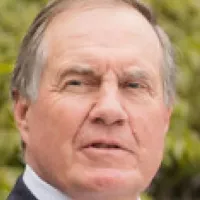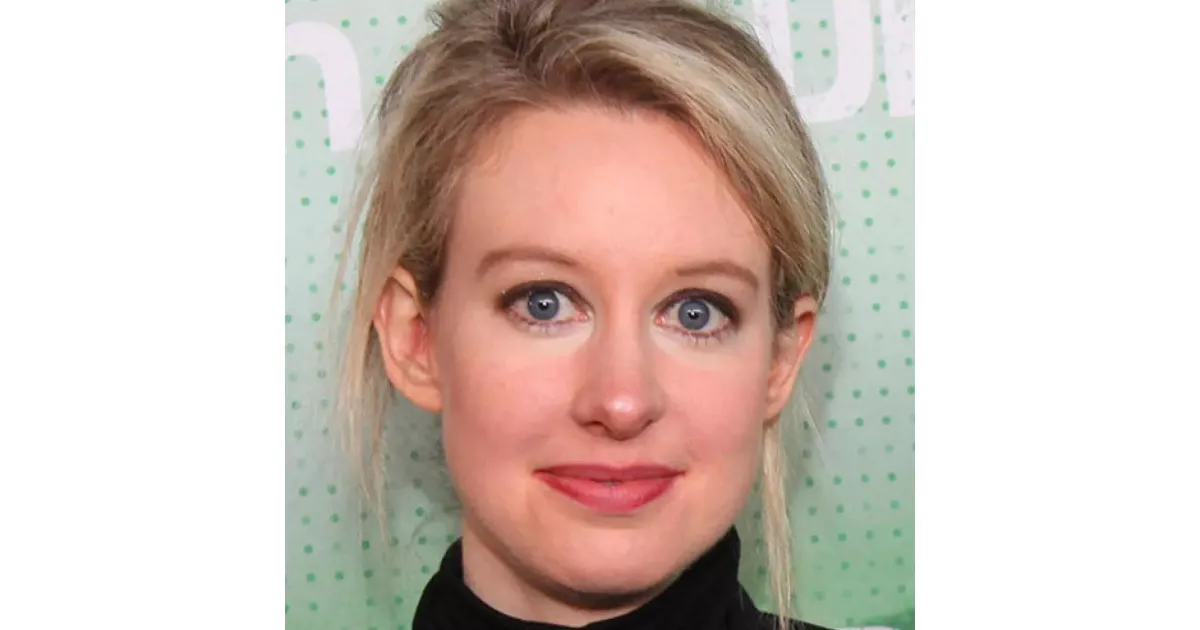Elizabeth Holmes is an American entrepreneur and the founder of Theranos, a blood-testing company that falsely claimed to have revolutionized blood testing with innovative methods using minimal blood. Theranos's valuation reached $9 billion, making Holmes the youngest self-made female billionaire in 2015, according to Forbes. However, investigations revealed the company's technology was fraudulent, leading to a drastic revision of Holmes's net worth to zero and tarnishing her reputation. She was subsequently convicted of fraud for her role in the Theranos scandal.
February 3, 1984: Elizabeth Holmes's Birth
On February 3, 1984, Elizabeth Anne Holmes, the founder of Theranos, was born. She later became a biotechnology entrepreneur.
2002: Holmes Attends Stanford University
In 2002, Elizabeth Holmes began attending Stanford University, where she studied chemical engineering and worked as a student researcher.
2002: Holmes met Sunny Balwani
In 2002, Elizabeth Holmes met Ramesh "Sunny" Balwani in Beijing as part of a Stanford University program. She was 18 and he was 19 years older and married.
2002: Balwani divorced his wife
In 2002, Sunny Balwani divorced his wife.
October 5, 2003: Holmes alleged sexual assault
On the evening of October 5, 2003, Elizabeth Holmes called the police and alleged she had been sexually assaulted at a fraternity house at Stanford that morning.
2003: Holmes started wearing black turtlenecks upon founding Theranos
Elizabeth Holmes said she started wearing black turtlenecks upon founding the company in 2003.
2003: Holmes and Balwani became romantically involved
In 2003, Elizabeth Holmes and Sunny Balwani became romantically involved, around the time Holmes dropped out of university.
2003: Holmes Founds Real-Time Cures
In 2003, Elizabeth Holmes founded the company Real-Time Cures in Palo Alto, California, later renamed Theranos, to "democratize healthcare".
2003: Holmes Reports Being Raped at Stanford
In 2003, Elizabeth Holmes reported that she was raped while at Stanford University.
2003: Holmes Works at Genome Institute of Singapore
In 2003, after her freshman year at Stanford, Elizabeth Holmes worked in a laboratory at the Genome Institute of Singapore, testing for SARS-CoV-1.
March 2004: Holmes Drops Out of Stanford and Starts Healthcare Company
In March 2004, Elizabeth Holmes dropped out of Stanford's School of Engineering and used her tuition money as seed funding for a consumer healthcare technology company.
December 2004: Holmes Raises $6 Million to Fund Real-Time Cures
By December 2004, Elizabeth Holmes had raised $6 million to fund Real-Time Cures, her company which would be renamed Theranos.
2005: Holmes and Balwani moved in together
In 2005, Elizabeth Holmes and Sunny Balwani moved into an apartment together.
2007: Holmes was suggested to copy Steve Jobs's look
In 2007, an employee suggested Elizabeth Holmes copy Steve Jobs's famous Issey Miyake turtleneck look.
2009: Balwani joined Theranos as COO
In 2009, Sunny Balwani officially joined Theranos, receiving the title of chief operating officer.
2010: Theranos Secures $92 Million in Venture Capital
By the end of 2010, Theranos had raised more than $92 million in venture capital.
July 2011: George Shultz Joins Theranos Board of Directors
In July 2011, former secretary of state George Shultz joined the Theranos board of directors after being introduced to Holmes.
September 2013: Theranos Announces Partnership with Walgreens
In September 2013, Theranos announced a partnership with Walgreens to launch in-store blood sample collection centers, ending its period of operating in "stealth mode".
2014: Holmes Appears on Magazine Covers
In 2014, Elizabeth Holmes gained increased media attention, appearing on the covers of Fortune, Forbes, T: The New York Times Style Magazine, and Inc.
2014: Holmes Recognized as World's Youngest Self-Made Female Billionaire
In 2014, Forbes recognized Elizabeth Holmes as the world's youngest self-made female billionaire, and her name appeared on numerous U.S. and foreign patents.
2014: Theranos Falsely Claimed 100 Million Revenue
In 2014, Theranos falsely claimed to have a $100-million revenue stream when the company only made $100,000.
June 2015: Partnership with Carlos Slim
In June 2015, Elizabeth Holmes partnered with Carlos Slim to improve blood testing in Mexico.
October 2015: #IronSisters initiative
In October 2015, Elizabeth Holmes announced the #IronSisters initiative to help women in STEM careers.
October 2015: Journal Publishes Article Detailing Inaccurate Results
In October 2015, the Wall Street Journal published John Carreyrou's article detailing how the Edison device gave inaccurate results, and revealing that Theranos was using commercially available machines.
2015: Theranos Employs 800+ at Its Height
At its height in 2015, Theranos had more than 800 employees.
2015: Forbes listed Holmes as one of U.S. Richest Self-Made Women
Forbes listed Elizabeth Holmes as one of U.S. Richest Self-Made Women in 2015 with a net worth of $4.5 billion.
2015: Holmes Establishes Agreements for Theranos Technology
In 2015, Elizabeth Holmes established agreements with Cleveland Clinic, Capital Blue Cross, and AmeriHealth Caritas to use Theranos technology.
2015: Awards and Recognition in 2015
In 2015, Elizabeth Holmes was awarded the Horatio Alger Award, named Fortune's Businessperson of the Year, listed in Fortune's 40 Under 40, member of Bloomberg's 50 Most Influential, presented with a Glamour Award by Jared Leto, and named a Presidential Ambassador for Global Entrepreneurship by Barack Obama.
2015: Forbes Names Holmes Youngest Self-Made Billionaire
In 2015, Forbes named Elizabeth Holmes the youngest and wealthiest self-made female billionaire in the United States, valuing her company at $9 billion.
2015: Acclaim received in 2015
In 2015, before the collapse of Theranos, Elizabeth Holmes was appointed a member of the Harvard Medical School Board of Fellows and was named one of Time magazine's "Time 100 most influential people". Holmes received the Under 30 Doers Award from Forbes and was ranked number 73 in its 2015 list of "the world's most powerful women". She was also named Woman of the Year by Glamour and received an Honorary Doctor of Humane Letters from Pepperdine University.
2015: Doubts About Theranos' Claims Emerge
In 2015, journalistic and regulatory investigations began to reveal doubts about Theranos's claims and whether Elizabeth Holmes misled investors and the government.
January 2016: CMS Sends Warning Letter to Theranos
In January 2016, the Centers for Medicare and Medicaid Services (CMS) sent a warning letter to Theranos after an inspection uncovered irregularities in its Newark, California, laboratory.
March 2016: CMS Proposes Ban on Holmes Owning Clinical Lab
In March 2016, CMS regulators proposed a two-year ban on Elizabeth Holmes from owning or operating a certified clinical laboratory.
June 2016: Holmes's stake in Theranos essentially worthless
In June 2016, Forbes released an updated valuation of $800 million for Theranos, which made Elizabeth Holmes's stake essentially worthless, because other investors owned preferred shares.
July 2016: CMS Bans Holmes from Blood-Testing Services
In July 2016, CMS banned Elizabeth Holmes from owning, operating, or directing a blood-testing service for two years. Walgreens ended its relationship with Theranos, and the FDA ordered the company to cease use of its Nanotainer device.
October 2016: Theranos Dismisses 340 Employees
In October 2016, Theranos dismissed 340 employees.
2016: Fortune names Holmes a disappointing leader
In 2016, Fortune named Elizabeth Holmes in its article on "The World's 19 Most Disappointing Leaders".
2016: Balwani left Theranos
In 2016, Sunny Balwani left Theranos in the wake of investigations; the circumstances of his departure are unclear.
January 2017: Theranos Dismisses 155 Employees
In January 2017, Theranos dismissed an additional 155 employees.
April 2017: Theranos Settles Arizona Lawsuit
In April 2017, Theranos settled a lawsuit with the State of Arizona, agreeing to refund the cost of blood tests to consumers and pay civil fines and attorney fees.
May 16, 2017: Theranos Shareholders Reach Agreement
On May 16, 2017, approximately 99 percent of Theranos shareholders reached an agreement with the company to dismiss all litigation and potential litigation in exchange for shares of preferred stock.
2017: Holmes met Billy Evans
In early 2017, Elizabeth Holmes first met William "Billy" Evans.
March 14, 2018: Holmes Settles SEC Lawsuit
On March 14, 2018, Elizabeth Holmes settled the SEC lawsuit by surrendering voting control of Theranos, returning shares, accepting a ban from holding an officer position, and paying a fine.
March 2018: Holmes owned half of Theranos's stock
Before the March 2018 settlement, Elizabeth Holmes owned half of Theranos's stock.
March 2018: SEC Charges Holmes and Balwani with Fraud
In March 2018, the SEC charged Elizabeth Holmes and Ramesh Balwani with fraud for raising over $700 million from investors while advertising a false product.
April 2018: Theranos Announces Layoffs of 105 Employees
In April 2018, Theranos announced plans to lay off 105 employees, leaving it with fewer than two dozen employees.
June 15, 2018: Holmes and Balwani Indicted on Fraud Charges
On June 15, 2018, Elizabeth Holmes and Sunny Balwani were indicted on multiple counts of wire fraud and conspiracy to commit wire fraud. Holmes resigned as CEO of Theranos but remained chairwoman.
June 2018: Holmes Indicted on Fraud Charges
In June 2018, a federal grand jury indicted Elizabeth Holmes and Sunny Balwani on fraud charges related to Theranos.
August 2018: Theranos Lays Off Remaining Employees
In August 2018, most of the remaining Theranos employees were laid off.
September 5, 2018: Theranos Announces Dissolution
On September 5, 2018, Theranos announced that it had begun the process of formally dissolving and liquidating its remaining assets.
2018: Carreyrou Publishes "Bad Blood"
In 2018, John Carreyrou published "Bad Blood: Secrets and Lies in a Silicon Valley Startup", detailing his investigation of Theranos and Elizabeth Holmes.
2018: SEC Charges Holmes with Fraud
In 2018, the SEC charged Elizabeth Holmes with raising $700 million from investors through fraud. She settled by paying a $500,000 fine and relinquishing control of Theranos.
2019: Holmes Marries William "Billy" Evans
In 2019, following the collapse of Theranos, Elizabeth Holmes married hotel heir William "Billy" Evans.
2019: Engagement to Billy Evans
In early 2019, Elizabeth Holmes became engaged to William "Billy" Evans.
July 2021: Birth of first child
In July 2021, Elizabeth Holmes gave birth to a son.
August 31, 2021: Holmes's Trial Begins
On August 31, 2021, Elizabeth Holmes's trial began in the U.S. District Court for the Northern District of California, after delays due to the COVID-19 pandemic and her pregnancy.
November 29, 2021: Holmes testifies about rape and abuse
On November 29, 2021, Elizabeth Holmes testified that she had been raped at Stanford and that Sunny Balwani was controlling and abusive during their relationship, allegations Balwani denied.
2021: Holmes Has First Child
In 2021, Elizabeth Holmes and William Evans had their first child together.
January 3, 2022: Holmes Found Guilty of Defrauding Investors
On January 3, 2022, Elizabeth Holmes was found guilty on four counts of defrauding investors. A mistrial was declared on other counts, which were later dismissed.
January 2022: Holmes Convicted of Defrauding Investors
In January 2022, Elizabeth Holmes was convicted of defrauding investors in the case of U.S. v. Holmes, et al., but acquitted of defrauding patients.
January 2022: NPR obtained police report
In January 2022, NPR obtained a copy of a partial police report from October 5, 2003, regarding Elizabeth Holmes's allegation of sexual assault.
October 2022: Pregnancy with second child
In October 2022, it was reported that Elizabeth Holmes was pregnant with a second child.
November 18, 2022: Holmes sentenced to federal prison
On November 18, 2022, Elizabeth Holmes was sentenced to 11+1⁄4 years in federal prison. She and Balwani were ordered jointly to pay $452 million in restitution to the victims of the fraud.
February 2023: Accusations of pregnancy as a delay tactic
In February 2023, Elizabeth Holmes was accused of conceiving a second child as a strategy for delaying the start of her prison term; she denied this.
May 17, 2023: Holmes ordered to surrender to custody
On May 17, 2023, Davila ruled that Elizabeth Holmes must surrender to custody on May 30, after accepting that she needed time to arrange childcare for her two children.
May 30, 2023: Holmes Begins Prison Sentence
On May 30, 2023, Elizabeth Holmes began serving her 11+1⁄4-year sentence at Federal Prison Camp, Bryan.
July 2023: Holmes's projected release date
In July 2023, the Bureau of Prisons projected that Elizabeth Holmes would be released from prison in 2032, approximately two years early, in accordance with the Bureau's guidelines for good conduct time.
2023: Holmes Has Second Child
In 2023, Elizabeth Holmes and William Evans had their second child together.
2023: Holmes confirms affectation of deep voice
In a 2023 New York Times interview, Elizabeth Holmes spoke in her natural, higher pitch voice, and confirmed that the low voice was an affectation.
June 2024: Ninth Circuit hears oral argument in Holmes's appeal
In June 2024, the Ninth Circuit heard oral argument in Elizabeth Holmes's appeal of her conviction and sentence.
February 2025: Court upholds Holmes's conviction
In February 2025, the U.S. Court of Appeals for the Ninth Circuit upheld Elizabeth Holmes's conviction.
Mentioned in this timeline

Barack Obama the th U S President - was the...
California is a U S state on the Pacific Coast...
Arizona is a landlocked state in the Southwestern U S...
Medicaid is a joint federal and state government program providing...
National Public Radio NPR is an American public broadcasting organization...

Jared Leto is an American actor and musician prominent for...
Trending
8 months ago Queens 10K Returns: Race, Festival, Kids Run & Community Engagement in 2025
4 months ago John Deere appointments, Origin Agritech restructure, and crowds at YP Field Days in September 2025.

2 months ago Belichick Eyes Wake Forest Amidst Giants Job Rumors: McDaniels Also in the Mix?

Joe Montana nicknamed Joe Cool and The Comeback Kid is a Hall of Fame quarterback who played seasons in the...

7 months ago Deion Sanders excited to rejoin Colorado, praises Joey McGuire, addresses health concerns.

2 months ago Billy Strings Teases Spring 2026 Tour Dates and Shares Activity Sheet.
Popular

Thomas Douglas Homan is an American law enforcement officer who...

William Franklin Graham III commonly known as Franklin Graham is...

XXXTentacion born Jahseh Dwayne Ricardo Onfroy was a controversial yet...

Jupiter is the fifth and largest planet from the Sun...

Instagram is a photo and video-sharing social networking service owned...

KFC or Kentucky Fried Chicken is an American fast-food chain...
